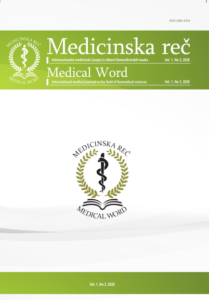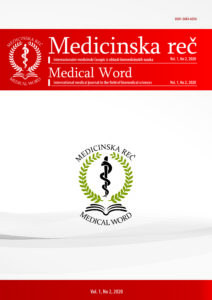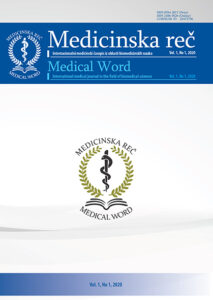Ethics and morality as a product of social awareness – survey results
Original article
Miodrag Savović, Marija Pajović, Ana Antić, Nebojša Vacić, Zvonko Zlatanović
16–21
https://doi.org/10.5937/medrec2301016S
Abstract
Ethics and morality are social phenomena that are formed by the way people interact with each other, and this is further determined by the socioeconomic and political structure of society, cultural and socioeconomic relations. The goal of this work is to analyze the answers to the survey questions and draw conclusions about morality as a product of social consciousness.
The research included 100 respondents who answered about morality as a product of social awareness in the area of the city of Nis in the period from October 20 until November 10, 2017. The questions were analyzed according to the gender, age, education, work status, and income of respondents. The test results are presented according to the answers to individual survey questions.
The results of the research showed that most of the respondents are not satisfied with their standard of living in relation to the standard of living in Serbia. The largest number of respondents have insufficient income and a budget that is small for larger investments and insufficient for adaptations in the household. The majority of respondents believe that they are not obliged to help others, while on the other hand, there are those who would like to help but lack financial resources for themselves, so in such a situation they do not think about others.
The general conclusion is that morality is at the lowest rungs of the social hierarchy. People who generally have good incomes, as opposed to people whose incomes are insufficient, behave more freely than those who do not.
Key words: ethics, morality, social awareness
Literatura
- Babin B. Ponašanje potrošača. Beograd: Data status; 2012.
- Filipović V, Kostić-Stanković M. Marketing menadžment. Beograd: Fakultet organizacionih nauka; 2007.
- Gidens E. Sociologija. Beograd: Ekonomski fakultet; 2003.
- Katančević S. Ponašanje potrošača. Beograd: Univerzitet Singidunum; 2005.
- Kešetović Ž. Sociologija društva. Beograd: Visoka škola za poslovnu ekonomiju i preduzetništvo; 2007.
- Košarac B. Društveni položaj stanovništva. Sarajevo: Filozofski fakultet; 2009.
- Maričić B. Ponašanje potrošača. Beograd: Ekonomski fakultet; 2011.
- Milisavljević M. Marketing. Beograd: Savremena administracija; 2003.
- Milanović-Golubović V. Međunarodni marketing i globalni biznis. Beograd: Megatrend univerzitet; 2003.
- Milanović V. Upravljanje marketingom. Beograd: Megatrend univerzitet; 2010.
- Mitrović Lj. Savremeno društvo: strategije razvoja i akteri. Beograd: Institut za političke studije; 1996.
- Nikolić R. Marketing. Beograd: Ekonomski fakultet; 2007.
- Nešković S. Sociologija. Beograd: Visoka tehnička škola strukovnih studija; 2010.
- Rakić B, Rakić M. Ponašanje potrošača. Beograd: Megatrend univerzitet; 2007.
- Rakić, B. Ponašanje potrošača. Beograd: Megatrend univerzitet; 2009.
- Rakas, S. Sociologija. Beograd: Megatrend univerzitet; 2009.
- Vasiljev S, Cvetković Lj, Kancir R, Pantelić D. Marketing menadžment. Subotica: Ekonomski fakultet; 2007.
- Živković R. Ponašanje potrošača. Beograd: Univerzitet Singidunum; 2011.
- https://www.b92.net/biz/vesti/srbija/ustedevina-gradana-srbije-manja-765779
- https://www.b92.net/biz/vesti/srbija.php?yyyy=2013&


















